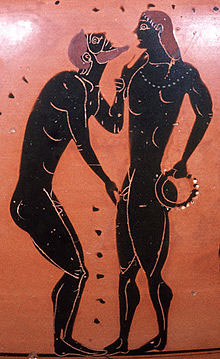|
|
Brief History of Human Sexual Behavior
Understanding the historical context of human sexual behavior is critical to conceptualizing theories about sexual health.
Academicians, religious institutions, philosophers, psychologists, sociologists and, today, sex therapists and research
experts have advanced volumes of theories about human sexual history. Many theories, especially those constructed
in the context of idiosyncratic moral and religious agendas, have promoted ideas that defy reason and discovered facts,
but in many cases, have also influenced a rise in relationship pathologies built on conditioned sexual incompetence.
An understanding of our sexual history is critical to sexual health, especially as it informs us about the
behaviors necessary for humans to engage in effective and successful socialization, relationships, creative endeavors and the ability to thrive.
Our theories about human sexual history are based on a blend of facts and observations derived
from the fields of evolutionary biology, atavistic insights from paleontology, anthropology, psychology and rationale intuition.
Underlying any and all discussions of our sexual history is the implication of the human
capacity to strive and thrive in the context of successful reproduction under the most adverse circumstances.
Estimates of the origins of the human species vary from 3 ‐ 5 million years, starting with the
discovery of a primitive ancestor, Lucy, founded by Paleoanthropologist Donald Johanson
in the area of Ethiopia and dated to 3.2 Million years. Dr. Johanson's find in 1974 set
the stage for continued discoveries that, in subsequent years resulted in additional
evidence for evolutionary potential beginning as long ago as 5 million years. To put
these finds into temporal perspective and considering the earth' s age of about 4.5 Billion
years, humans appeared very recently in global development.
By any measure, the human species, especially it's young are fragile. The odds of
survival were overcome only by extremely unique circumstances credited only to our unique evolutionary sexual development.
In order for human species to advance, strive and thrive, a unique sex drive unlike most all other mammals
was programmed into our genes that enhanced reproductive success and optimized chances of survival.
Most mammals engage in sexual strategies timed to specific bio proclivities such as seasonal fertility estrus cycles.
The offspring mature quickly to become healthy self-sufficient survivors and competitors in a matter of months to a few years.
Humans, on the other hand, are born helpless, in fragile health and requiring many years of development to reach a
state of self-sufficiency. Success rate for continued human child survival is tenuous. These circumstances demanded
an evolutionary adjustment that required a longer time period for sexual activity that meant reproductive success
was a constant necessity.
To facilitate the survival of the human species, sex became a sophisticated behavior
strengthened by competitive pressures and cognitive anomalies not necessarily as well defined in other mammal
species. Humans, like apes, are highly social. For most of human evolutionary history, survival strategies were
contingent on social bonding within small dedicated groups that formed roving communities. Within the group,
functions such as sexual conduct were in the open, highly frequent and, in two unique ways, goal seeking, first
to orgasm and secondly to produce offspring in a way that favored passing on the healthiest and strongest genes.
Prolific sex was necessary in order to maintain a constant flow of offspring, who, more often than not, did not survive.
Successful to term birth meant a long period of perilous waiting without any guarantees. Sexual attraction between
members of the tribe was an essential survival strategy that aimed to optimize successful breeding through
sperm competition that provided the chance for the strongest and healthiest genes to penetrate and predominate.
Promiscuity was essential to the reproductive success of humans, both men and women.
Brief History by William G. Dubree, PhD
|



|
|
Understanding the historical context of human sexual behavior is critical to conceptualizing theories about sexual health.
Academicians, religious institutions, philosophers, psychologists, sociologists and, today, sex therapists and research
experts have advanced volumes of theories about human sexual history. Many theories, especially those constructed
in the context of idiosyncratic moral and religious agendas, have promoted ideas that defy reason and discovered facts,
but in many cases, have also influenced a rise in relationship pathologies built on conditioned sexual incompetence.
An understanding of our sexual history is critical to sexual health, especially as it informs us about the
behaviors necessary for humans to engage in effective and successful socialization, relationships, creative endeavors and the ability to thrive.
Our theories about human sexual history are based on a blend of facts and observations derived
from the fields of evolutionary biology, atavistic insights from paleontology, anthropology, psychology and rationale intuition.
Underlying any and all discussions of our sexual history is the implication of the human
capacity to strive and thrive in the context of successful reproduction under the most adverse circumstances.
Estimates of the origins of the human species vary from 3 ‐ 5 million years, starting with the
discovery of a primitive ancestor, Lucy, founded by Paleoanthropologist Donald Johanson
in the area of Ethiopia and dated to 3.2 Million years. Dr. Johanson's find in 1974 set
the stage for continued discoveries that, in subsequent years resulted in additional
evidence for evolutionary potential beginning as long ago as 5 million years. To put
these finds into temporal perspective and considering the earth' s age of about 4.5 Billion
years, humans appeared very recently in global development.
By any measure, the human species, especially it's young are fragile. The odds of
survival were overcome only by extremely unique circumstances credited only to our unique evolutionary sexual development.
In order for human species to advance, strive and thrive, a unique sex drive unlike most all other mammals
was programmed into our genes that enhanced reproductive success and optimized chances of survival.
Most mammals engage in sexual strategies timed to specific bio proclivities such as seasonal fertility estrus cycles.
The offspring mature quickly to become healthy self-sufficient survivors and competitors in a matter of months to a few years.
Humans, on the other hand, are born helpless, in fragile health and requiring many years of development to reach a
state of self-sufficiency. Success rate for continued human child survival is tenuous. These circumstances demanded
an evolutionary adjustment that required a longer time period for sexual activity that meant reproductive success
was a constant necessity.
To facilitate the survival of the human species, sex became a sophisticated behavior
strengthened by competitive pressures and cognitive anomalies not necessarily as well defined in other mammal
species. Humans, like apes, are highly social. For most of human evolutionary history, survival strategies were
contingent on social bonding within small dedicated groups that formed roving communities. Within the group,
functions such as sexual conduct were in the open, highly frequent and, in two unique ways, goal seeking, first
to orgasm and secondly to produce offspring in a way that favored passing on the healthiest and strongest genes.
Prolific sex was necessary in order to maintain a constant flow of offspring, who, more often than not, did not survive.
Successful to term birth meant a long period of perilous waiting without any guarantees. Sexual attraction between
members of the tribe was an essential survival strategy that aimed to optimize successful breeding through
sperm competition that provided the chance for the strongest and healthiest genes to penetrate and predominate.
Promiscuity was essential to the reproductive success of humans, both men and women.
Brief History by William G. Dubree, PhD
| |
Quality of Life is People Striving to Thrive© |
|









